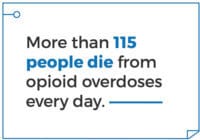- Jul 13
- AddictionDrug Addiction TreatmentPreventionTreatment
Two million people over the age of 12 abused prescription pain relievers in 2015. This prescription drug abuse is a growing public health concern that is considered part of the opioid crisis or opioid epidemic.
In addition to the harms of drug abuse, prescription drug withdrawal symptoms can be difficult and potentially lethal. Therefore, you should not try to manage withdrawal alone. If you or a loved one is at risk or currently addicted to prescription pain medications, Gateway can help. We offer programs for men, women and adolescents to help manage withdrawal from prescription drugs and take the first step toward recovery.
What Is Prescription Drug Misuse?
 Prescription drug misuse occurs when a prescription medication is taken in a way not intended by the doctor who prescribed it. Some examples of misusing prescription drugs include taking more than the recommended dose, taking unprescribed pills, or snorting or injecting ground-up pills to get high. The most commonly misused prescription drugs are:
Prescription drug misuse occurs when a prescription medication is taken in a way not intended by the doctor who prescribed it. Some examples of misusing prescription drugs include taking more than the recommended dose, taking unprescribed pills, or snorting or injecting ground-up pills to get high. The most commonly misused prescription drugs are:
- Opioids used to treat pain, including oxycodone (Oxycontin) and hydrocodone (Vicodin and Norco)
- Anti-anxiety medications and sedatives used to treat anxiety and sleep disorders, including Xanax, Valium and Ambien
- Stimulants used to treat ADHD and some sleep disorders, including Ritalin, Adderall and Dexedrine
Opioid misuse and addiction rates have been rising for years and have hit all-time highs. In fact, more than 115 people die from opioid overdoses every day.
What Are the Risks of Prescription Drug Abuse and Misuse?
Prescription drugs provide benefits when used correctly. However, prescription drug misuse can be just as dangerous as illicit drug use. The side effects of prescription drugs range from unpleasant to dangerous for the recreational user, and the effects and dangers are intensified when these drugs are combined with each other, alcohol or illegal street drugs. Overdose deaths are the leading cause of injury death in the U.S., and opioid addiction, including prescription pain relievers and heroin dependence, is responsible for more than half of these deaths.
Although prescription drug misuse carries significant risks regardless of the drug, the effects can vary. For instance:
- Misuse of opioids, narcotics and pain relievers can result in life-threatening respiratory depression (reduced breathing).
- Misuse of depressants, including benzodiazepines, tranquilizers, barbiturates and sedatives, can lead to seizures, respiratory depression and decreased heart rate. Withdrawal from barbiturates can be life-threatening.
- Stimulant misuse can cause high body temperature, irregular heart rate, cardiovascular system failure and fatal seizures. It can also result in hostility or feelings of paranoia.
- Individuals who misuse prescription drugs by injecting them expose themselves to additional risks, including HIV, hepatitis B and C and other blood-borne viruses.
Dangerous… Even When Prescribed
Even when used as recommended, combining multiple prescription drugs can be dangerous. Talk to your health provider about the medications and supplements you take to ensure you’re not putting your health at risk. Additionally, always ask the following questions before beginning a new prescription:
- Will this medicine work safely with the other prescription and nonprescription medicines I’m currently taking?
- What are the possible side effects of this medicine and what should be done if they occur?
- Does this prescription drug have the potential for addiction and/or misuse?
- What are the specific signs and symptoms of addiction or misuse I need to be watchful for (for myself or for someone else)?
Signs of Prescription Drug Abuse
The warning signs of prescription drug misuse can be behavioral and physical and vary from drug to drug. Behavioral symptoms might include:
- Irritability, mood swings or a change in personality
- Loss of interest in appearance and hobbies
- Anger or abusive behaviors
- Lying and deceitful behavior
Physical symptoms are often easier to recognize and can help identify which type of drug your loved one is using.
- Opioid abuse symptoms: confusion, droopy or watery eyes, slurred speech, slow gait, constant flu-like symptoms, dry or itchy skin, constricted pupils, sleepiness, nausea and vomiting.
- Depressant abuse symptoms: decreased attention span, impaired judgment, lack of coordination, memory problems, slurred speech, slowed reflexes and respiratory depression.
- Stimulant abuse symptoms: loss of appetite, weight loss, anxiety and delusions, dilated pupils, paranoia, tremors, sweating, hyperactivity, repetitive behaviors and skin flushing.
How to Treat Prescription Drug Abuse
Withdrawal from prescription pain medications may seem impossible, but it’s not. Seeking professional help is critical for long-term success. Gateway offers tailored programs and Medication-Assisted Treatment to help manage withdrawal in a safe and professional environment. After detox, high-quality addiction therapy services are all available to help develop the tools needed to lead a successful, drug-free life. To learn more, contact Gateway today at 877.505.4673.


